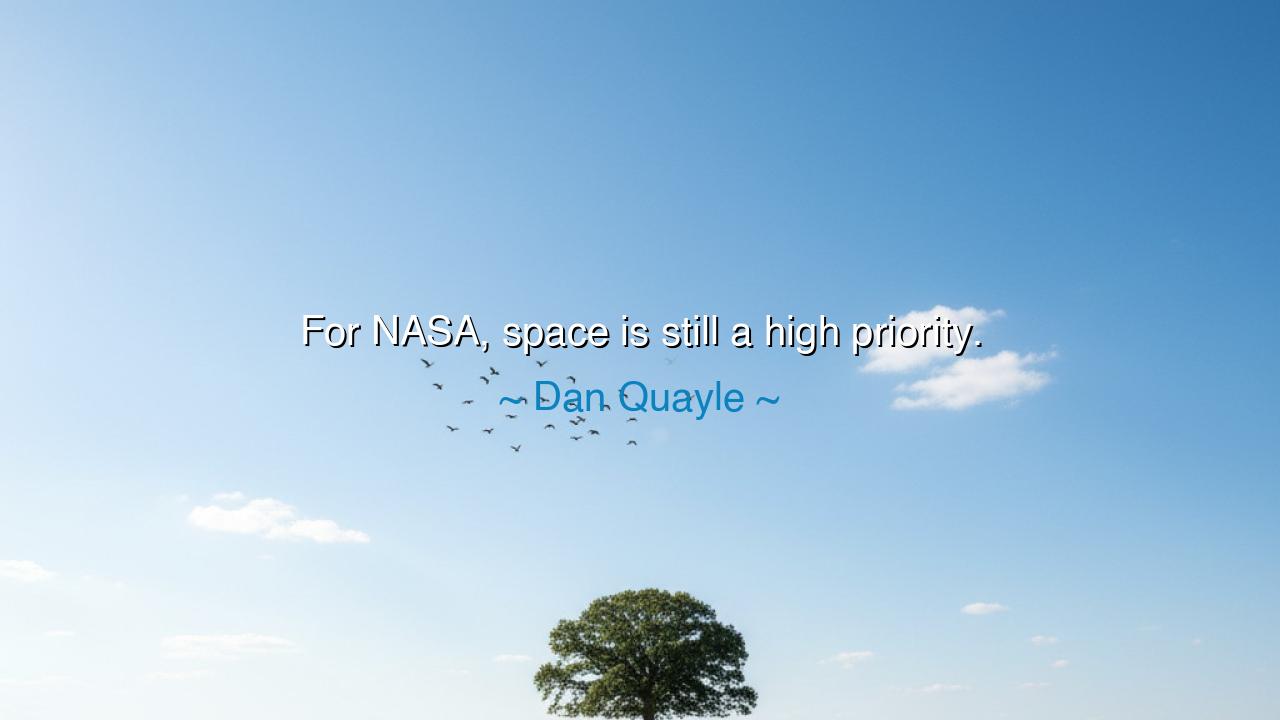
For NASA, space is still a high priority.






In the grand, ever-expanding universe, where the stars burn with ancient light and the cosmos stretches into infinity, there is a profound truth about human ambition and exploration. The words of Dan Quayle, "For NASA, space is still a high priority," remind us of a timeless pursuit—the quest to explore the unknown, to venture beyond the boundaries of our world, and to understand the very nature of the universe that surrounds us. For as long as humanity has gazed up at the heavens, we have been driven by the desire to uncover the mysteries of the stars and to carve our place in the vastness of space. This quest, which began in ancient times, still burns brightly today in the hearts of those who continue to strive for greatness in the cosmos.
In the ancient world, the heavens were not just a physical realm, but a symbol of the divine, the eternal, and the infinite. The Greeks looked to the sky and saw it as a realm of the gods, a place of perfection and order. The great philosophers, such as Plato and Aristotle, speculated on the nature of the stars and the movement of the planets, believing that their movements held the key to understanding the divine order of the universe. Even as far back as Babylonian astronomers, the heavens were seen as a holy space, to be studied with reverence and awe. To explore the stars, to understand the movements of the planets, was to reach for something far beyond human understanding, something greater and more mysterious than the earth beneath their feet.
The pursuit of space exploration, as Quayle states, remains a priority, echoing the ancient longing to understand the vast cosmos. When NASA was founded in the 1960s, it represented not just the desire to conquer space, but the human ambition to expand our understanding, to go further than ever before. Just as the ancient Greeks sought wisdom from the stars, so too does NASA strive to unlock the secrets of the universe. The Apollo missions, culminating in the historic moon landing in 1969, were not merely about planting a flag on a distant world; they were about proving that humanity could reach the stars and unravel the mysteries of the cosmos. NASA, in its own way, is carrying forward this ancient ambition, striving to reach not just the moon, but the farthest corners of space.
In the modern era, space remains a high priority not just for scientific discovery, but for the future of humanity itself. As Quayle acknowledged, space exploration is vital to our progress—both in terms of technological innovation and in our understanding of the world and our place within it. The Space Shuttle, Hubble Space Telescope, and, more recently, Mars rovers like Curiosity and Perseverance, continue to expand our knowledge and shape the course of humanity. The knowledge gained through space exploration impacts every aspect of our lives, from medicine and communication to our understanding of Earth’s environment. NASA’s ongoing commitment to space exploration ensures that the pursuit of knowledge and discovery is not just for the present, but for future generations as well.
The lesson of Quayle’s words is one of enduring importance: space is not just a scientific frontier; it is a symbol of our highest aspirations, our eternal desire to push beyond the limitations of our physical world. It is easy to become distracted by the day-to-day concerns of our lives—the challenges we face, the struggles that seem to consume us—but space reminds us of something greater. In the vast expanse of the cosmos, we are but a tiny speck, yet through exploration, we discover our place in the universe, and in doing so, we also discover our potential as a species. The study of space is not just for the scientists or astronauts, but for all of humanity, for it calls us to reach higher, to look beyond ourselves, and to embrace the unknown with curiosity and courage.
Just as the ancient explorers sailed uncharted seas in search of new lands, so must we look to the heavens as our next frontier. In the modern age, we too are voyagers, bound for distant stars and planets, driven by the same desire to discover and explore that has defined humanity for millennia. The question is not whether we should continue to explore space, but how we can foster a sense of shared responsibility and vision for the future. Whether through collaboration with international partners, the support of scientific endeavors, or the pursuit of sustainable exploration, we must all recognize that space is not a distant, disconnected realm, but a place that touches the very core of who we are as a species.
Let us then embrace the words of Quayle with reverence and vision, understanding that space is not just a final frontier, but a challenge that calls us to greatness. The exploration of space will not only bring about new discoveries, but will forever shape the story of humanity. As we continue to reach for the stars, we carry the legacy of the ancients, whose gaze was always fixed upward, ever seeking to understand the great mysteries of the universe. And just as they once saw the stars as a reflection of divine order, we too must see our exploration of space as a reflection of our own divine potential—forever striving, forever exploring, forever growing toward the infinite.






AAdministratorAdministrator
Welcome, honored guests. Please leave a comment, we will respond soon